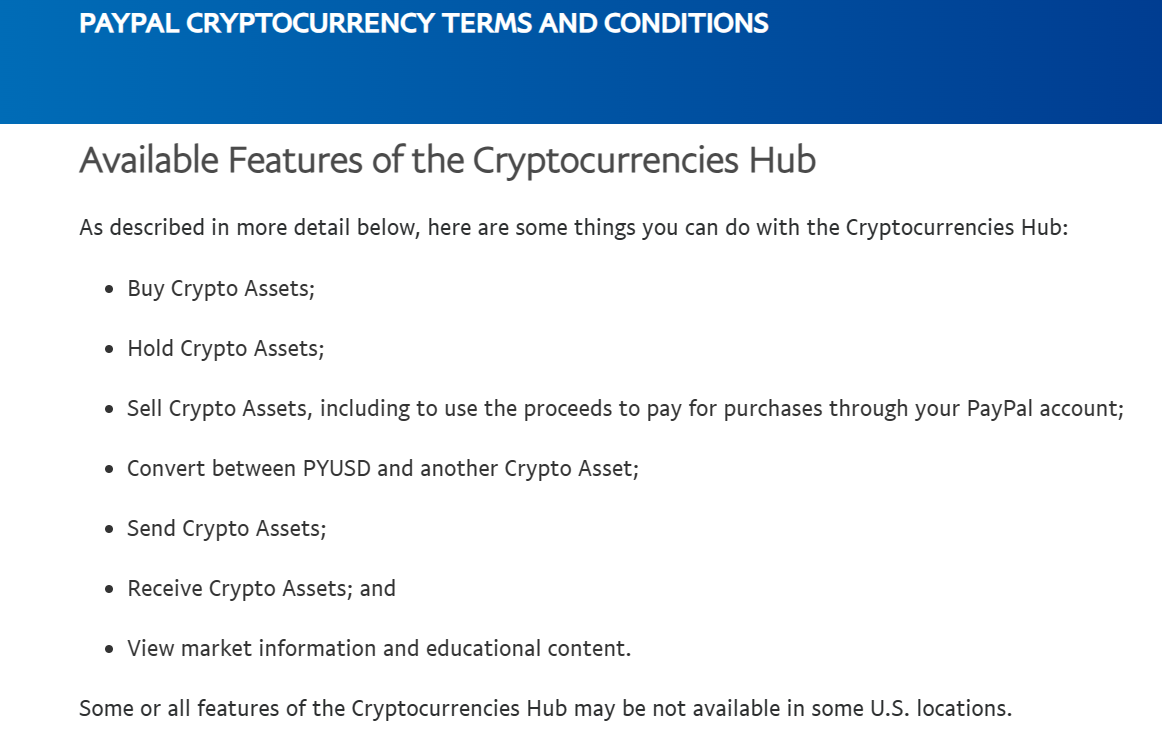Payments giant PayPal, soon after launching the dollar-backed stablecoin PayPal USD ($PYUSD), updated its terms and conditions to introduce Cryptocurrencies Hub — a feature that allows users to hold and interact with Bitcoin (BTC) and cryptocurrencies in their PayPal account.
The latest PayPal terms and conditions detail the prerequisites for crypto users interested in using the platform for cryptocurrencies. The Cryptocurrencies Hub is key for PayPal to reinvent itself as a crypto-inclusive platform. According to the company, the service will allow for the sale and purchase of cryptocurrencies. In addition, it will facilitate the payment for purchases via PayPal using the money stored after the sale of cryptocurrencies.

The Cryptocurrencies Hub will also be crucial to convert between $PYUSD and other crypto assets. PayPal further clarified:
“Any balance in your Cryptocurrencies Hub represents your ownership of the amount of each Crypto Asset shown. You will not hold the digital Crypto Assets themselves in your Crypto Asset balance.”
However, not all PayPal users will get to explore the new feature as the company will decide its access from person to person. For starters, to be eligible for Cryptocurrencies Hub, a PayPal user must have “a personal PayPal account and a Balance Account in good standing.” In addition, PayPal will also verify the required identifying information — which includes name, physical address, date of birth, and taxpayer identification number — provided by the users:
“You can only use your Cryptocurrencies Hub as part of your Balance Account by accessing it through your personal PayPal account. If you are a Hawaii resident, we will not allow you to establish a Cryptocurrencies Hub at this time.”
Upon rollout of the feature, Cryptocurrencies Hub will be directly linked to the users’ PayPal account and can be accessed using the existing credentials.
Related: PayPal’s crypto holdings increased by 56% in Q1 2023 to nearly $1B
The launch of PayPal USD divided the crypto community as contradicting speculations around its impact on crypto took center stage.
This is the Ethereum contract address for PayPal's stablecoin.
— RYAN SΞAN ADAMS - rsa.eth (@RyanSAdams) August 7, 2023
I can't believe i get to tweet that.
We've come so far. pic.twitter.com/S6kSqcV4ut
While many envision $PYUSD to fast-track Ether’s (ETH) mainstream adoption, it could also spell trouble for decentralization and personal control of assets, warns the community. Several smart contract auditors highlighted that $PYUSD’s smart contract contains “freezefunds” and “wipefrozenfunds” functions, which they claim are textbook examples of centralization attack vectors in Solidity contracts.
 cointelegraph.com
cointelegraph.com
